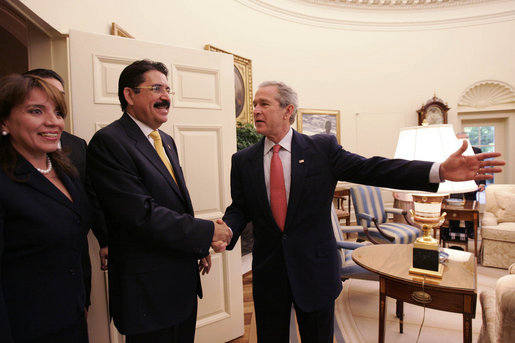
It's really impressive how quickly the Wall Street Journal's Mary Anastasia O'Grady had the pro-coup talking points ready to go for Honduras. Apparently waking up a country's president, bundling him into a plane to Costa Rica and installing a new president while the nation is under curfew is all just protection of democracy. It's strange that no one came up with that idea for getting Al Gore into the presidency after the 2000 election.
But anyway, there's another interesting thing about Honduras. It should lay to rest the idea that free trade deals strengthen democracy. When George Bush was pushing for the passage of the US-Central America Free Trade Agreement (CAFTA), this was a key argument --
By leveling the playing field for our products, CAFTA will help create jobs and opportunities for our citizens. As CAFTA helps create jobs and opportunity in the United States, it will help the democracies of Central America and the Dominican Republic deliver a better life for their citizens. By further opening up their markets, CAFTA will help those democracies attract the trade and investment needed for economic growth.
This economic growth will boost demand for U.S. goods and reduce poverty and contribute to the rise of a vibrant middle class. This economic growth will raise working standards and will deliver hope and opportunity to people who have made the choice for freedom. The more opportunity that Central Americans have at home to provide for themselves and their families means it's less likely that someone looking for a job will try to come to this country illegally.
By strengthening the democracies in the region, CAFTA will enhance our nation's security. Two decades ago, many of the CAFTA nations struggled with poverty and dictatorship and civil strife. Today, they're working democracies, and we must not take these gains for granted. These nations still face forces that oppose democracy, seek to limit economic freedom, and want to drive a wedge between the United States and the rest of the Americas. The small nations of CAFTA are making big and brave commitments, and CAFTA is a signal that the United States will stand with them and support them. By helping the CAFTA nations build free societies, we'll help them eliminate the lawlessness and instability that terrorists and criminals and drug traffickers feed on. And this will make our country safer.
CAFTA is more than a trade bill; it is a commitment among freedom-loving nations to advance peace and prosperity throughout the region. As the oldest democracy in the Western Hemisphere, the United States has a moral obligation and a vital national security interest in helping democracies in our neighborhood succeed, and CAFTA advances this goal.
That's a long passage to excerpt but it's needed to bring out how bizarre the theory was: better market access for US goods in Central America somehow induces these countries to get more investment which in turn makes them want to be more democratic and in turn the CAFTA deal means that US "stands with them" in support of their efforts to deepen democracy.
But while you might have thought that one possible expression of Bush's idea is that the US should express concern when a CAFTA country bundles its president onto a flight to a Costa Rica, we now learn from the conservatives that in fact it's the bundlers and not the bundlee that we're supposed to be supporting as part of democracy promotion which in turn was due to earlier support for free trade.
It's left as an intellectual exercise for conservative economists to prove that the bilateral trade in presidents between Honduras and Costa Rica is consistent with factor endowments in each country.
Photo: When George Bush and Manuel Zelaya were friends.
No comments:
Post a Comment